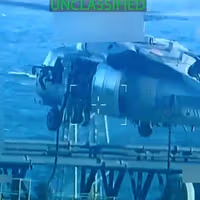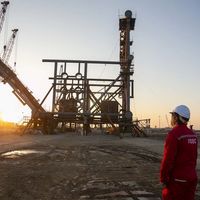Australia targets Iran's missile program with new sanctions
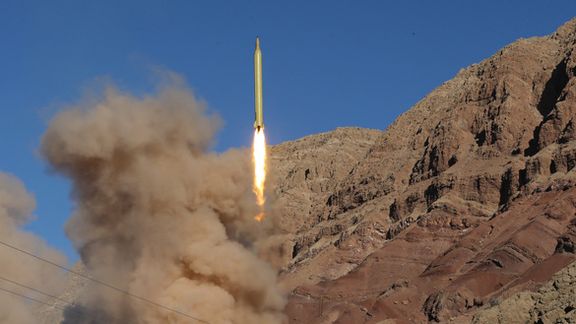
Australia has imposed financial sanctions and travel bans targeting individuals associated with the Iran's missile program, two weeks after Tehran's missile barrage against Israel.

Australia has imposed financial sanctions and travel bans targeting individuals associated with the Iran's missile program, two weeks after Tehran's missile barrage against Israel.
Similar sanctions imposed by the European Union and the United Kingdom were enacted on Monday to curb Tehran's missile development efforts.
Tuesday’s sanctions by the Albanese government target two directors and a senior official in Iran’s Aerospace Industries Organization, the director of the Shahid Bagheri Industrial Group, and the commercial director of the Shahid Hemmat Industrial Group.
The entities, which enhance Tehran’s military capabilities, have previously faced sanctions over their involvement in the country’s missile development and military activities. The Aerospace Industries Organization develops and produces military and civilian aerospace technologies, focusing on ballistic missiles. The Shahid Bagheri Industrial Group manufactures missile systems, while the Shahid Hemmat Industrial Group specializes in liquid-fueled missiles.
“Iran’s 1 October launch of over 180 ballistic missiles against Israel was a dangerous escalation that increased the risk of a wider regional war,” the Australian statement read.
Since Iran’s recent missile barrage on Israel, its second direct attack in six months, both the region and the West are on high alert for Israel's anticipated retaliation.
According to The Washington Post, Prime Minister Benyamin Netanyahu has given assurance to the Biden administration that Israel will refrain from attacking Iran’s nuclear or energy facilities.
Some US allies in the region have lobbied Washington to prevent Israel from striking oil facilities in Iran for fear that their own oil infrastructure would be hit in a counterattack, according to reports by Reuters and the Wall Street Journal. They have conveyed to Washington that they disapprove of Israeli or American use of their airspace for any attack on Iran or having their land used as a launchpad for any strike, the WSJ reported last week.
The US, meanwhile, expanded its sanctions last Friday, targeting Iran's so-called “ghost fleet” of ships and related companies operating in the United Arab Emirates, Liberia, Hong Kong, and other jurisdictions that reportedly facilitate the transport and sale of Iranian oil to buyers in Asia. Additionally, the State Department designated a network of companies based in Suriname, India, Malaysia, and Hong Kong for allegedly coordinating the sale and transport of petroleum and petroleum products from Iran.
The UK’s sanctions, announced this week, targeted senior figures in Iran’s army, air force and organizations linked to Iran’s ballistic and cruise missile development.
The EU sanctions, approved during a meeting of the bloc’s foreign ministers in Luxembourg on Monday, targeted seven individuals and seven entities involved in the transfer of military technology to Russia.
“Today’s designation includes individuals and entities responsible for the development and transfer of unmanned aerial vehicles (UAVs), missiles and related technology to Russia in support of its war of aggression against Ukraine, and to armed groups and entities undermining peace and security in the Middle East and the Red Sea region,” read a statement by the European Council.

A Lebanese Shia, now seeking refuge in Canada after escaping Hezbollah indoctrination and surviving an assassination attempt by the Iran-backed group, has shared insider knowledge of Hezbollah's operations with Iran International.
Pledging allegiance to the Islamic Republic of Iran and its Supreme Leader, chanting death to Israel, death to America, is part of the daily routine for Lebanese kids going to schools linked to Hezbollah, said Hussein El Hajj Hassan.
Speaking over Zoom from Ottawa, Hussain recalls how young boys in his community were initially targeted by Hezbollah for religious indoctrination.
After being scouted, they would learn how to operate guns and weapons and taught that dying was a worthy cause of their mission, according to Hussain.
According to a report by the Anti-Defamation League, Hezbollah- run educational institutions and their umbrella organizations appear to reach more than 100,000 children a year in Lebanon.
"To believe in the culture of death. They want them to believe that their path is to die," he said.
They would start out by training in Lebanon and then some would go to Iran for what Hussain described as "intense training."
Some of these boys, who were in their early teens, died while training in Iran, and were later being adorned with ‘Martyr posters' and death announcements throughout his Beirut suburb, according to Hussein.
"Sometimes they would shoot while they were running during training, and some would be injured...others would get killed. But it's a risk they were willing to take."
“The society believed that Iran is the source. That they are providing all goods to Lebanon and to Hezbollah.”
Hezbollah was painted as a resistance movement existing to serve Lebanon, he said.
'A society within society'
Hussein said the structure of Hezbollah was very deep and secretive, but at the same time, its operatives and supporters in his Beirut suburb were open and obvious.
He described seeing men with weapons like Kalashnikovs in the streets, guarding buildings that were clearly used by Hezbollah agents. Hezbollah even had their own jails and religious courts, he recalled, saying it was like Hezbollah had created its 'own society within a society. '
"What we're seeing today in the war, Israel's hitting buildings. Hezbollah is hiding inside. We know that. When I saw that, I knew, I saw these buildings before."
"Hezbollah operatives owned gas stations and restaurants, all connected to a private landline network, separate from the rest of Lebanon," Hussain said. He added that they relied on pagers and walkie-talkies until September, when thousands of these devices, rigged by Israel, exploded, killing scores and injuring thousands of militiamen.
Hussein's mother, a Shia Muslim, sent her sons to a Christian school to receive a formal education, that included learning in Arabic, English and French. His dad, a supporter of Hezbollah, was absent from his life. He recounts himself as being lucky for that.
He said some of his uncles and cousins were – and may still be – Hezbollah members.
Hussein believes his cousins and other community members joined the ranks for either money, religious purposes or the desire for power.
Despite his mother’s efforts, he still wasn’t completely shielded from indoctrination, with the media he watched and society he lived in advocating against Jews and Israel.
"On television shows they would show Jews as evil, as a state or as people who just want to kill or want to conquer."
His mother is now dying of cancer, and Hussein can’t be with her. He feels like Hezbollah robbed him of a life in his motherland.
How Hezbollah held him hostage
While Hussain has gratitude for his new life and new beginnings – he admits he didn’t want it.
“No one wants to start from scratch. That's the cost I'm paying for. What Hezbollah has done to Lebanon.”
He recounts terrifying moments with Hezbollah that he described as life changing, leading to his decision to flee and seek political refugee status in Canada.
Hussain was protesting Hezbollah’s intervention in Syria in 2013, rallying outside the Iranian embassy in Beirut with his friends, when he says Hezbollah forces stormed out of the Iran embassy, indiscriminately attacking while the Lebanese army allegedly stood by and did nothing.
“We were protesting peacefully. We were attacked. And one of the leaders of these protests was shot in the abdomen and killed,” said Hussain.
His friend Hashem Salman was killed.

He watched it all unfold, pleading for help.

In another incident, he says he was talking outside his friend’s Beirut home, when a Hezbollah operative threw an explosive device at the two men. Hussain and his friend escaped unharmed, but he knew it would likely happen again – and the next time he might not be so lucky.
The assassination attempt, he believes likely resulted from his work as a journalist and as a peace activist, advocating for friendship between Lebanon and Israel.
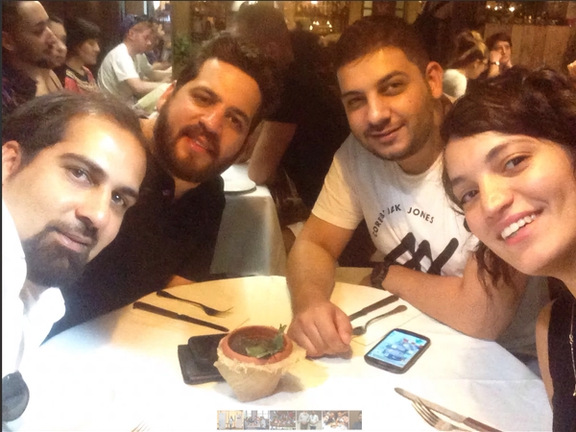
After escaping near death, he said he received a call from the Lebanese army, telling him to stop writing articles as a journalist if he wanted to survive. He said the problem runs deeper than Hezbollah.
“It's not just Hezbollah. It's the absence of safety provided by the state, the government, from the police.”
The killing of Hassan Nasrallah
While Hossein doesn’t want war, he believes that military intervention was the only way to deal with Hezbollah. At least as a first step, he said.
He sees Iran as a wild card and can’t predict what move the Islamic Republic will make.
Does Iran want to move more towards nuclear negotiations and give up on Hezbollah as a bargaining tool in talks with the West or is the country weak, and unable to withstand Israel?
Whatever the answer is, will determine, how to further dismantle Hezbollah after Israeli military intervention, he said.
He believes that Hezbollah had become powerful through Iran, and its fundraising through crime. According to the Foundation for Defense of Democracies (FDD), critical of Iran and its allies, Hezbollah’s overseas revenue streams include drug trafficking, blood diamonds, illicit timber and even human trafficking.
The killing of Hassan Nasrallah, the longtime leader of Hezbollah, who was assassinated in an Israeli air attack on Beirut last month, brought Hossein both shock and relief.
He felt Nasrallah was always “untouchable” but gained a sense of calm knowing he was really gone, feeling that it brought justice to his friend Hashem who he said was killed by Hezbollah operatives in the 2013 protest.
"We saw the police standing and just watching, looking. And there was a moment where I tried to run towards them. I came to the soldiers, and I was like, please take us from this area. And he pushed me back. He said, we don't have the orders to intervene to do anything."
Hossein told Iran International he is seeing a therapist to heal his wounds, but the wounds of his homeland Lebanon, cannot heal, until Hezbollah and Iran cease to coerce Lebanon into the failed state it has become, he said.
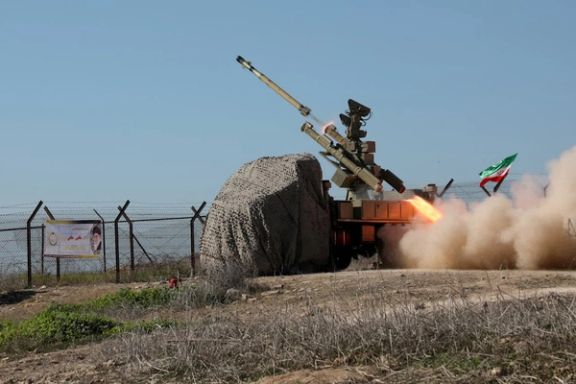
On the back of new sanctions, Iran has denied supplying ballistic missiles to Russia as domestic media blames Moscow for exacerbating Tehran's challenges while offering no support in return.
"Iran is bearing the cost due to Russia's actions, while Moscow, prioritizing its national interests and its dependency on the UAE, aligns with them on the issue of Iran's three islands," Rouydad24 wrote on Tuesday.
On Monday, the European Union imposed a fresh round of sanctions on Iran, specifically targeting Iran Air and several other entities, citing Tehran's involvement in supplying missiles and drones to Russia. The measures target individuals and organizations facilitating the transfer of military technology.
Rouydad24 also noted that if Iran is truly not complicit, Russia could assist in proving this to the international community, yet it remains silent. "Iran has borne a significant burden as a result of the Russia-Ukraine war despite deriving no benefit from the conflict. The recent reimposition of sanctions on Iran Air, which were painstakingly lifted during the JCPOA, directly impacts the Iranian people," it added.
On Sunday, Iranian Foreign Minister Abbas Araghchi posted on X that during a meeting in New York with Josep Borrell and Enrique Mora, he had reiterated Iran's denial of providing ballistic missiles to Russia.
"I clearly said, and reiterate once again: we've not provided ballistic missiles to Russia. If Europe needs a case to appease Israel's blackmail, better find another story," he wrote.
His remarks followed a report from The Wall Street Journal, in which EU reporter Laurence Norman claimed that during a meeting in New York with EU foreign policy chief Josep Borrell, Araghchi acknowledged that Iran had sent short-range missiles with a range of 250 kilometers to Russia.
Norman wrote, “Senior EU official says Araghchi acknowledged in NY that Iran had sent missiles to Russia of less than 250km range. He claimed they were not 'ballistic' missiles.”
The European Union's latest decision follows earlier warnings from March 2024, when the European Council stated that any transfer of ballistic missiles by Iran to Russia would lead to further sanctions.
In September, following the United States' announcement of sanctions against Iran Air for allegedly delivering ballistic missiles to Russia, the United Kingdom, Germany, and France quickly followed suit, imposing their own sanctions on the airline.
In response, even conservative media outlets acknowledged the situation, attributing the blame to Russia for the resulting consequences. In a commentary titled "New Sanctions for the Sake of Russia," the conservative Nameh News website remarked, "Iran is paying a high cost for Russia's war against Ukraine. Iran has not been gaining anything from Russia's war against Ukraine."
The article directly blamed the missile sales to Russia as the cause of fresh sanctions, including those reimposed on Iran Air, which had been lifted following the 2015 nuclear agreement. Nameh News also stressed that the sanctions directly affect the Iranian people, underscoring the broader consequences of Iran's involvement in Russia's conflict.
Araghchi criticized the move, stating, "Western countries still do not understand that sanctions are a failed tool and have not proven their effectiveness in practice."
Iran Air had been operating direct flights to several major European cities, including Frankfurt, Hamburg, Paris, and London, before the sanctions.
Iran has faced widespread criticism for its deepening military ties for Russia, particularly for supplying drones and missiles, which has also triggered global sanctions.

In the early hours of Tuesday, October 15, Iran’s state television briefly showed Esmail Qa’ani sitting in silence among mourners who received the body of Abbas Nilforoushan’s, the IRGC’s deputy operations commander.
The broadcast did not disclose Qa’ani’s whereabouts over the past two weeks, but it implied that he had returned to Tehran with Nilforoushan’s body. Nilforoushan, who assumed responsibility for Lebanon after Mohammad Reza Zahedi’s death in an April attack on the Iranian consulate in Damascus, was killed alongside Nasrallah and other senior Hezbollah figures during the October 7 Israeli strike on Hezbollah’s command center in southern Beirut.
During Qa'ani's absence from public view rumors began to circulate that the commander of the Quds Force was also killed in an Israeli air strike while visiting Beirut. Then, reports alleged that he was arrested in Tehran on suspicions of being an Israeli mole. During this time, Iran’s government and the IRGC evaded any explanation about his whereabouts and his fate.
Qa’ani was last seen in public on October 1, two days after Hassan Nasrallah, the Secretary-General of Hezbollah, was killed in an Israeli airstrike on the group’s command center in Dahiya, southern Beirut. At that time, Qa’ani was reported to have visited Hezbollah's representative office in Tehran.
In the aftermath of multiple high-profile assassinations of Hezbollah's top leadership, fingers were pointed at a deep and pervasive Israeli infiltration within the organization or among Iranian officials.
Last week, Middle East Eye reported that Esmail Qa'ani, commander of Iran’s Quds Force, had been detained and was under interrogation as Tehran sought to uncover how Israel managed to penetrate Hezbollah, its key Lebanese ally, and execute the killings of its senior figures.
Sky News Arabia, citing Iranian sources, further alleged that Qa'ani had suffered a heart attack during questioning. According to the report, Iranian investigations were increasingly focused on his chief of staff, Ehsan Shafiqi, and his potential ties to Israel.
Media speculation suggested Qa'ani may have been present at a subsequent meeting with his designated successor, Hashem Safieddine, when another bombardment occurred on October 3. However, an advisor to the commander-in-chief of the Islamic Revolutionary Guard Corps (IRGC) dispelled these claims on Wednesday, asserting that Qa'ani was "in perfect health" and would soon be decorated with a military medal of honor by Supreme Leader Ali Khamenei.
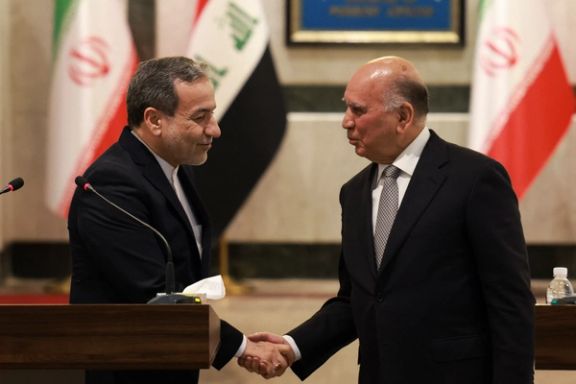
Iran officially declared on Monday an end to its "indirect" negotiations with the United States, which were seemingly aimed at lifting US sanctions and restraining Israel from pursuing the defeat of Hamas and Hezbollah.
Iranian Foreign Minister Abbas Araghchi told reporters on Monday that "The indirect talks between Iran and the United States with Oman's mediation has been stopped due to the situation in the region." He added that "Currently we do not see any reason for continuing the talks."
The main reason for the talks that apparently stopped long ago while President Ebrahim Raisi was in office in Tehran was reportedly Iran's unwillingness to discuss matters other than the Iranian nuclear program and the sanctions, while the United States insisted that there was no point in following the discussions without including Iran's regional ambitions and its contribution to international terrorism in the agenda.
Throughout last week, Araghchi and Parliament Speaker Bagher Ghalibaf traveled to key capitals in the Middle East and beyond, seeking to prevent Israel from launching a retaliatory strike against Iran following the October 1 missile barrage on Israel.
Israel's anticipated retaliation has sparked a deep sense of insecurity within the Iranian government and among the public. On the streets and across social media, Iranians are expressing fears of sleepless nights, anxiously awaiting Israel's response as both sides continue to exchange threats. The international media's coverage of Israeli attacks on Lebanon and renewed strikes on Gaza has only heightened the anxiety, leaving ordinary Iranians increasingly alarmed.
Araghchi's statement came a day after he issued two threats against the United States during a speech in Iraq. He warned that the US was endangering the lives of its soldiers by deploying the THAAD air defense system to Israel, which will be operated by US troops. He further added that there are no red lines preventing Iranian forces from targeting those who threaten Iran's interests.
He also wrote in a post on X: "The US has been delivering record number of arms to Israel. It is now also putting lives of its troops at risk by deploying them to operate US missile systems in Israel. While we have made tremendous efforts in recent days to contain an all-out war in our region, I say it clearly that we have no red lines in defending our people and interests."
Prominent conservative politician Heshmatollah Falahatpisheh commented on Araghchi's statement on X, writing: "After visiting six regional capitals, Araghchi’s remarks signal the failure of Iran’s delayed diplomacy. Nations are now bracing for a war that will bring nothing but regret for all sides."
During Araghchi's tour of the Middle East, it appeared that Iran was signaling to Israel and the United States that its retaliation could be minimal if Israel's strikes on Iranian targets remain controlled and limited. Meanwhile, Israeli officials ramped up their rhetoric after media reports revealed that Iran's recent attack had caused significant damage. To make matters worse, a Hezbollah drone strike on an Israeli military base killed several servicemen and wounded around 40.
Speaker Ghalibaf's visit to Beirut was aimed at demonstrating that Iranians are unfazed by Israel's military power. Videos circulating on social media showed him in the cockpit of an airliner, which his supporters used as a major publicity stunt to restore his tarnished image, following heavy criticism during Iran's recent elections.
However, aviation experts on social media said the aircraft was on autopilot and there was another pilot in charge while Ghalibaf pretended to be bravely landing in Beirut, looking out of the window “like a truck driver.” The former IRGC general is a trained pilot but not for civilian airliners.
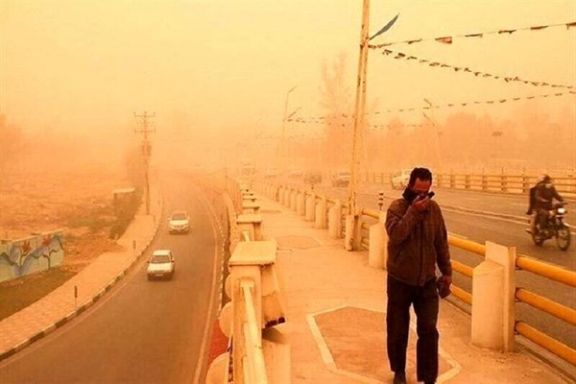
More than 7,000 tuberculosis cases were reported across Iran last year, according to the Ministry of Health, with the highest concentrations in the provinces of Sistan-Baluchistan in the southeast and Golestan in the northeast.
Speaking to the semi-official ILNA news agency, the head of the Ministry’s Tuberculosis and Leprosy Division, Mahshid Nasehi, noted that other provinces with significant case numbers included Gilan, Khuzestan, Khorasan Razavi, Qom, and Yazd.
Nasehi also stated that there is no province without reported tuberculosis cases and added that, in Tehran province, the incidence rate of tuberculosis relative to the population is higher than the national average.
The official noted that among the 7,261 identified cases, 44% were women, and 25% were non-Iranians. Pulmonary tuberculosis, primarily affecting the lungs, was the most common form, accounting for over 80% of all cases.
At Zabol University of Medical Sciences in Sistan-Baluchistan, the program head reported in August that dust storms in the Sistan region are contributing to an increase in serious diseases, including tuberculosis.
Higher tuberculosis rates, like those in Sistan-Baluchistan and Golestan, are usually driven by a combination of factors. Proximity to high-tuberculosis countries increases exposure through cross-border movement, while limited healthcare access delays diagnosis and treatment. Environmental challenges, such as frequent dust storms, weaken respiratory health, making people more vulnerable. Socioeconomic factors, including poverty and overcrowded living conditions, further facilitate its spread.
Nasehi emphasized Iran’s overall relative success in managing the disease but cautioned that the high rates in neighboring countries pose a risk that could potentially compromise these achievements.
According to World Health Organization estimates, Iran’s annual tuberculosis incidence stands at 11 cases per 100,000 people, equating to roughly 10,000 new cases each year.
In comparison, Pakistan reports 258 cases per 100,000 people (around 600,000 cases annually), while Afghanistan reports 185 cases per 100,000 (approximately 76,000 cases per year).
Tuberculosis, a contagious infectious disease, can affect many parts of the body, including the bones, joints, brain, kidneys, and skin. However, it most commonly targets the lungs due to the bacterium's high need for oxygen. It primarily spreads through the air, making it possible for anyone to contract the disease simply by inhaling airborne particles.
In Western countries, tuberculosis rates are significantly lower than in many parts of Asia and Africa. The highest incidence in the West is generally seen in countries with higher rates of immigration from tuberculosis-endemic regions or where certain vulnerable populations – those with HIV or in close living quarters like homeless shelters and prisons) have higher exposure risks.
Treating drug-resistant tuberculosis, Nasehi said, is far more challenging and costly than treating drug-sensitive tuberculosis.
Drug-sensitive tuberculosis treatment costs around 1 million tomans with a high recovery rate (over 95%) and lasts about six months. In contrast, drug-resistant tuberculosis treatment is significantly more expensive at approximately 500 million tomans, has a lower recovery rate (around 60%), and requires 18 to 24 months of treatment.
She emphasized that incomplete or irregular treatment can lead to drug resistance, a risk that’s heightened by the lengthy treatment period, which makes adherence more difficult. The Ministry of Health says it provides tuberculosis medications free of charge through Iran’s national healthcare system.
In Iran, October 15 is designated as National Tuberculosis Awareness Day.

